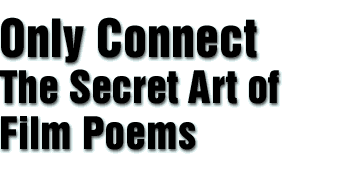|
 |
||
|
By Gareth Evans |
Film as poem as film. Let's not get snared in definitions. P. Adams Sitney, the eclectic archivist of celluloid experiment, whose insider directory 'Visionary Film: The American Avant-Garde 1943-78' remains the exploratory benchmark, claims the term Film Poem came, was useful, and gone by the late Fifties. He does however acknowledge the productive link it still makes between marginalisation and finance. Poetry vs Prose, Film poem vs Feature. Self-finance vs leisure Capital. Private statement vs Public assembly. Out-law vs In-house. Crude but workable. We know what he means, and so let's run with it. It's poor art, more, it's holy art, given the timbre of the times. Watching these films we hear a different drum.
But what about the content? The context is clear, the relationships in place. But the stuff, the things they are... Dead end to expect pat visual verse. Ok, some are image-poesy collaborations. Which came first is redundant. There's a fusion, the hybrid creature (the mouse with an ear on its back, all the better to listen for the cat) a working-out of binary discussions, but the poetry in common and anatomical, the POETRY runs deeper. These films, sensitive offspring of the experimental-avant-animation-underground crowd, are acute manifestations of concealed realities. They focus tight on the actual, the physical - the fact of matter, and through intense scrutiny, in which the medium, the translating vessel of celluloid can be felt as directly as fur, attain a poetic truth where word, image, sound and duration all shoulder effect. Poetry in its active sense grows out of the seen. It's no deus ex..., it does not rain from above. These films map the most difficult area. They pay attention (and repay it).
They're also about a relationship to light, available or altered. Sources of retinal distress, retinal calm, are they best viewed in the early trance of dawn, or the 'blue hour' of evening, at the thresholds of illumination, transitional points when they can either add their textured gleam to the general heightened ambience or indeed smuggle the strange energy of those moments off the grid for their own ends. Ideally they would be injected directly into the eye, the better for fast dissemination through the body, or at the very least screened personal onto the underside of the eyelid, for they are lucid sleep projects, maverick personal experiments with mercuric celluloid whose spontaneous combustion of crude narrative logic and visual realisms releases a liminal energy approximate to that found in the engines of dream journeys. The witnessing of them should be various and unexpected (it requires a certain surrender), the goal of difficult voyages through the raining city on failing transit systems, the surprise and pleasurable encounter with a foreign artist across a Steenbeck in the digital palace overlooking the old square, or in the basements of The Institute, in small rooms like monastic cells, behind steel doors borrowed from meat freezers or walk-in vaults.
They rupture both reality and the received expectations of the visual. Short fuses to a large result, they negotiate a potent relationship to the clock. Made on borrowed or liberated time, with the urgency of hours pulled clear of the grind, they are the product of patience and pressure. Almost impossible to imagine a feature-length project, except through fragment accumulation. And that's missing the point anyway. Its about the concentration of idea, the layering, metaphor on metaphor to build a new structure. Only what is necessary, but never functional. Joy at the fecundity, the colours. Ascetic commonwealths. These are films that can be scrolled into the mouth, can be smuggled across borders (out of cover, across the open ground of the screen, and back into the forest). They thrive on hearsay and whispered rumour, amplify themselves through absence, are compact and supple enough to escape, like insects, through the cracks of the crumbling monolith...
With thanks to Peter Todd, Ben Cook and Eva at the Lux for their assistance.
Gareth Evans is a freelance writer and reviewer. He is currently co-curating a New Portuguese Film Festival (to tour the UK in 2000) and co-editing Rogue Transmissions, a book of interviews with maverick British artists, writers and filmmakers, to be published by Rebel Inc.
Full article published in Filmwaves - Issue 9, Autumn 1999. Subscribe now!

